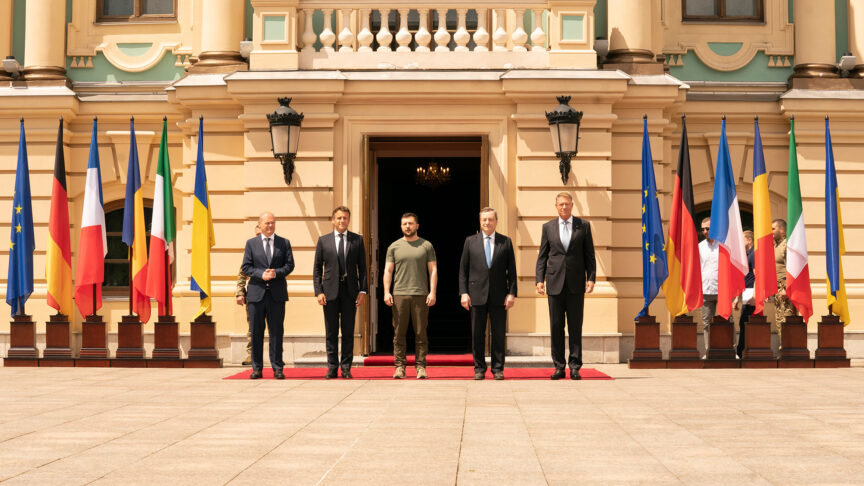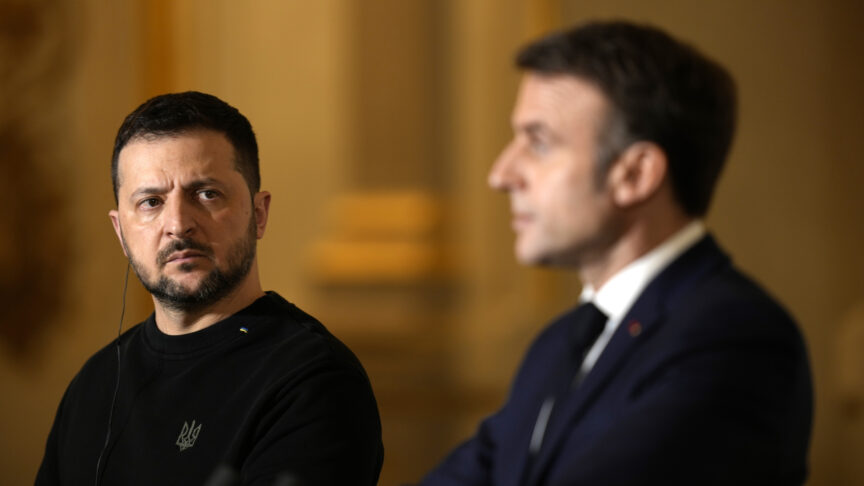Join forces: How to sustain public support for Ukraine’s EU accession
Most Europeans now support Ukraine’s accession to the EU. Yet the union’s energy, economic, and security policies will need to address public fears if it is to sustain this support.
Four days after Russia launched its full-scale invasion of Ukraine, President Volodymyr Zelensky submitted his country’s application to join the European Union. Moldova and Georgia added theirs just a few days later. For European leaders, these applications brought a new dimension to the challenge of making a unified, rapid, and strategic response to Russia’s aggression. They also revived the debate on the effectiveness of EU enlargement policy – which has faced significant criticism for its failures in the Western Balkans in the past two decades.
Ukraine’s request came at a decisive time for the EU’s geopolitical capacity to act. And the union’s response presented an opportunity to not only show unity and strength in its support for Ukraine, but also to restore the credibility of the EU’s enlargement policy.
French President Emmanuel Macron, German Chancellor Olaf Scholz, and Italian Prime Minister Mario Draghi recently visited Kyiv to show their solidarity with Zelensky and the Ukrainian people. They declared that they fully supported Ukraine’s EU candidacy, which sent a strong signal to other member states.
The day after their visit, European Commission President Ursula von der Leyen recommended candidate status for Ukraine and Moldova (but not Georgia, due to the country’s persistent political crisis and democratic backsliding). Representatives of the 27 EU member states will make their final decision at the meeting of the European Council on 23-24 June. This will be a test of the bloc’s unity, as any decision to grant this status needs to be unanimous.
European leaders should recognise that even respondents who appear to be opponents of Ukraine’s accession in polls may not necessarily be against it
A consensus on Ukraine’s accession
Member states’ discussions on enlargement will continue regardless of the outcome of the upcoming Council meeting. They will need to agree on a way forward, either through accession negotiations with Ukraine and Moldova or as part of an alternative response. Public opinion will almost certainly influence European leaders’ decisions on these issues.
A new poll by the European Council on Foreign Relations shows that, while Europeans are divided on how they believe Russia’s war on Ukraine will end, they are largely united in their support for Ukraine’s accession to the EU. This is consistent with the results of several previous polls.
Who these supporters are and how they want the EU to react will be important to decision-making in Brussels and other European capitals. European leaders should recognise that even respondents who appear to be opponents of Ukraine’s accession in polls may not necessarily be against it – but could simply be cautious and pragmatic.
According to ECFR’s study, citizens of Poland, Portugal, Finland, and Sweden are the most likely to support Ukraine’s accession to the EU. French, German, and Italian citizens are the least likely – although most of them are still in favour. These are also the three countries in which most people would prefer a swift end to the war even if this required Ukraine to make concessions. And, although they broadly favour the EU’s responses to the war – such as its increased economic and diplomatic sanctions on Russia, embargo on fossil fuel imports from Russia, and greater economic and military assistance for Ukraine – they are less likely to do so than respondents in other countries.
Supporters of Ukraine’s accession
Among the 57 per cent of Europeans who support Ukraine’s accession, there is an equal split between the “Peace” and “Justice” camps. That is, 29 per cent want the war to end as quickly as possible, while the same proportion want to punish Russia.
Moreover, supporters of Ukraine’s accession are more concerned than the opponents that Russia will use nuclear weapons (69 per cent) or chemical weapons (53 per cent), but are much less fearful of an economic downturn. Supporters also strongly back the EU’s efforts to reduce its dependence on Russian oil and gas, with 71 per cent saying member states should do so as soon as possible.
Interestingly, among the 35 per cent of Europeans who do not want to decouple from Russia (compared to the 49 per cent who do), a plurality still support Ukraine’s accession. Nonetheless, 80 per cent of EU citizens who support Ukraine’s accession are strongly in favour of cutting all economic, diplomatic, and cultural ties with Russia. And 90 per cent of them agree that the EU should accept more Ukrainian refugees. They do not necessarily agree on how many refugees to accept, but a plurality would welcome any number of them.
Support for Ukraine’s candidate status seems to go hand in hand with support for certain kinds of responses to the war. More than 70 per cent of supporters want to increase EU sanctions on Russia, provide greater economic and military assistance to Ukraine, halt imports of Russian fossil fuels, back Ukraine’s admission to NATO, and deploy troops to eastern Europe. They are slightly less enthusiastic about enforcing a no-fly zone and deploying EU member states’ troops in Ukraine – but, still, a plurality back both measures.
Opponents of Ukraine’s accession
Sixty per cent of opponents of Ukraine’s accession want a swift end to the war. They are also more likely than supporters to believe that the EU will be worse off as a result of the war – a divide that is especially clear in France and Germany. Furthermore, opponents are more concerned than the supporters about rising energy prices and the increased cost of living.
Still, 43 per cent of opponents blame Russia for the war and 53 per cent think Russia is the biggest obstacle to peace. Furthermore, 59 per cent of opponents want their countries to host more Ukrainian refugees. This indicates that, even though they do not want Ukraine to join the EU, this might simply be because they fear the negative economic and political consequences of its accession.
Most opponents do not want to cut all ties with Russia. And they are more likely than supporters to favour climate-conscious solutions to the energy crisis. Forty-three per cent say it is important for the EU to increase its supply of green energy to tackle climate change, even if this means continuing to rely on Russian oil and gas in the short term.
Finally, opponents of Ukraine’s accession are split in their attitudes towards the EU’s responses to the war. Fifty-one per cent of them want to provide greater economic assistance to Ukraine, while 36 per cent do not; 47 per cent would like to increase economic and diplomatic sanctions on Russia, while 43 per cent would not; and 51 per cent support a halt to imports of Russian fossil fuels, while 35 per cent do not. However, a resounding 79 per cent and 80 per cent of opponents are against the deployment of EU member states’ troops to Ukraine and Ukraine’s accession to NATO respectively. Sixty-one per cent of opponents are against further arms shipments to Ukraine, while 63 per cent do not want to deploy more troops to NATO’s eastern flank.
The backing of the EU accession path for Ukraine
ECFR’s poll reveals the complexity of public opinion on Ukraine’s accession to the EU. If the country gains candidate status, it will be just the beginning of a long road to full membership. It will be important for the EU to ensure that the public continue to support Ukraine’s accession throughout the process. This would help Ukraine avoid the stalled negotiations and unpleasant situations that have often characterised Western Balkans countries’ candidacies.
The EU should allow security concerns to guide its approach to Ukraine’s request for accession and should clearly communicate the security advantages of enlargement to the east. Candidate status would push Ukraine and Moldova to undertake the wide-ranging democratic, rule of law, and security reforms that help create strong and resilient states. In the case of Ukraine, the EU accession process should also boost the political, military, and financial support the country needs to defeat Russia and engage in reconstruction.
At the same time, the EU’s Russia policy will play an important role in sustaining widespread support for its policies on its eastern neighbourhood, including enlargement. The EU needs to reassure its citizens that support for Ukraine and enlargement to the east will not escalate the conflict, including in relation to Russia’s potential use of chemical or nuclear weapons.
Brussels and member states should also prioritise energy and economic policies that can address Europeans’ fears about the war. This could both reinforce their support for Ukraine’s accession and reassure those who currently oppose it.
Finally, European leaders should capitalise on public solidarity with the Ukrainian people to convince EU citizens that Ukraine belongs in the union. They should promote the idea that, ultimately, Ukraine’s accession will help the EU defend itself – be it against Russia or other hostile forces in its neighbourhood.
The European Council on Foreign Relations does not take collective positions. ECFR publications only represent the views of their individual authors.




